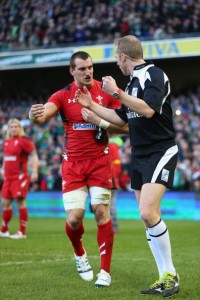
All wrapped up: George North is shackled by Rob Kearney as Wales were suffocated tactically by Ireland
By Paul Williams
Wales. Shutdown.
Wales were comprehensively beaten by Ireland in as one sided a victory as we have witnessed under Warren Gatland. Wales were completely shutdown in all aspects of the game. This current Ireland squad already have a reputation for their ‘choke tackle’ but they took their suffocation tactics to a new level on Saturday – these were the sort of choking tactics that a Dickensian serial killer would have been proud of.
In truth the 26-3 score line and key statistics don’t truly reflect the level to which Ireland blunted the Welsh game plan. The core statistics say Wales had 51% possession and 50% territory. In reality, they had little quality possession and very few opportunities to attack in the Irish 22. The Welsh lineout was a major issue and its inability to function forced Wales into an attritional carrying game which bore little yardage but many a turnover and handling error – not a single Welsh player carried the ball over 45m. There have been many great performances from this Welsh side and there will be many more to come. But this wasn’t one of them, far from it.
Too many penalties
You simply can’t concede 16 penalties in a game of test rugby and expect to win – Ireland conceded just nine. Wales had actually conceded six penalties in the first 18 minutes which gifted Ireland a simple six point lead after 16 minutes. Six points may not seem like a big margin but in test rugby – it is. It means that you need a converted try just to take a one point lead. And when you consider that Wales have only scored two or more tries on just two occasions in the last 12 months – gifting six easy points is a luxury that can be ill-afforded at this level.
There will be many aspects of the Welsh performance that will leave Gatland seething – but the penalty count will be top of the hate list. It’s worth noting that whilst many of the Welsh penalties were uncontestable, conceding a penalty for a double movement is possibly the most unfair rule in rugby. Tries are hard enough to come by in test rugby. Penalising a player for trying is harsh. Surely a scrum to the opposition is a more equitable solution?
No territory
The statistics say that Wales, over 80 minutes, actually had 50% of the territory. But that stat belies the regularity with which Wales were pinned in their own half by the exemplary kicking of Jonathan Sexton. In fact Wales were pinned in their half so often that you could at times have cut the Aviva Stadium in half and just played on one side of the pitch. Sexton took great pleasure in rolling accurate kicks behind the Welsh back three. It was an immensely successful tactic. George North, Leigh Halfpenny, Alex Cuthbert and Liam Williams spent considerable periods of the game turning and running back into their own 22.
Sexton’s kicks often rolled painfully near to the touchline leaving the Welsh defence narrow clearance angles or no option but to run into touch. But perhaps the most significant territorial stat is Wales’ goal kicking percentage. Wales only had one shot at goal in 80 minutes – which came after 56 minutes. Wales’ inability to gain meaningful territory essentially took Leigh Halfpenny’s goal kicking out of the game. And when Leigh Halfpenny’s goal kicking was out of the game, so were Wales.
Lineout reliability
Wales’ inability to gain territory certainly wasn’t helped by the fragility of their lineout. Kicking a penalty to touch and winning the lineout is the simplest way to gain 40 yards in test rugby. Without it you’re forced to make hard carries and ten phase sets just to gain half that distance. This, as Wales found out to their cost, increases the likelihood of turnovers and handling errors – Wales turned the ball over 18 times against Ireland.
It would be easy to blame the weather for the failings of the Welsh lineout – but that would be disingenuous. Ireland played in the same conditions and their lineout work was impeccable – as was their rolling maul which led directly to two tries. It would also be naive to blame the inadequacies of the Welsh lineout on the hookers alone. A lineout is an eight man job and all eight must take responsibility.
Tactical ‘dead end’
When the Welsh game plan works it is very effective – but when it doesn’t there is seemingly no Plan B. Wales’ inability to change the game plan in the face of overwhelming pressure was perhaps the most worrying aspect of the game on Saturday. Faced with limited quality possession and territory Wales still stuck to Plan A – using big ball carriers running straight lines into contact. As the points margin widened and the clock ticked the Welsh carriers became ever more desperate – regularly spilling the ball in contact and coughing up uncharacteristic turnovers.
Contrast this with Joe Schmidt’s tactics. He has the ability to change them with the flip of a coin. This is a coach who, at Leinster, developed one of the most attractive brands of rugby in the world – a fusion of Super Rugby back play and Northern Hemisphere forward play. Yet against Wales he took that playbook, doused it in Irish whiskey and torched it, choosing instead to execute one of the most claustrophobically accurate kicking strategies that you will see. Hat tip to Mr Schmidt – a masterstroke.









